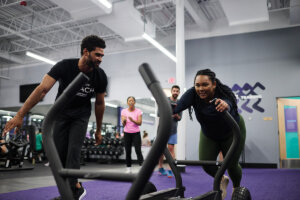It’s a debate as old as time: Is it better to work out in the morning or at night? The reality: The best time to work out is when you can fit it into your schedule. But every choice has pros and cons. Let’s break them down.
The best time of the day to work out
The first factor to consider is your chronotype. You’ve heard the terms “night owl” and “early bird,” and your chronotype is based on when your energy is highest during the day. Night owls, for example, typically prefer exercising in the evening when their energy levels are higher. Early risers may feel more motivated to work out first thing in the morning as a way to kick-start their day.
However, choosing your workout time isn’t only a matter of simple preference. Your health and fitness goals might also influence the best time to work out. To complicate matters, many of us must also consider things like work schedules and childcare when planning exercise.
So yeah, it’s a lot to weigh. Don’t worry. We’re here to explain when morning workouts are ideal and when to push them to the evening.
Benefits of morning workouts
A major perk of hitting the gym in the morning is that it allows you to check your workout off your to-do list before you get busy with other tasks. This makes it easier to stick to a routine. If you save your workout for later, you’ll have more time to consider excuses for skipping it.
Another benefit? Morning workouts can help you sleep better. Research on the link between sleep and exercise shows that people spend less time lying in bed awake and wake up fewer times during the night after a morning workout than an evening workout. Early exercise also helps people with insomnia fall asleep faster.
Since sleep is essential for overall health and exercise recovery, the benefit of morning workouts can’t be overstated. Research also shows that morning workouts have a positive effect on energy levels, alertness, focus, and decision-making. In other words, an early sweat sesh is great for productivity!
Morning workouts to try
To reap the benefits of a morning gym sesh, try these workouts aimed at boosting your mood and energy levels:
Working out on an empty stomach
It’s a common quandary for morning exercisers: Should I eat first or wait until after my workout?
Food provides the fuel your body needs to exercise, but some people aren’t ready to eat as soon as they hop out of bed. If you don’t have an appetite first thing in the morning, it might be fine to skip the pre-workout brekkie. In fact, exercising on an empty stomach (known as a “fasted state”) helps you burn more fat than exercising after a meal (known as a “fed state”). Why? Because your body is forced to tap into existing fat stores for fuel instead of using the food you just ate. This might help you lose weight.
However, working out on an empty stomach has a few downsides. For starters, you’ll run through your fuel stores much quicker, which may mean you can’t exercise as long or as intensely as if you’d had something to eat. If your health goals are around building muscle, fueling up on high-protein foods is important. Plus, many people get nausea, fatigue, and general discomfort when exercising in a fasted state.
Ultimately, you know your body best. If a pre-workout bite is out of the question and you can work out on an empty stomach just fine, go for it! However, most of us will probably feel best going into a workout with some fuel in our system. Even a quick, high-carb snack like an apple or a piece of toast can make a difference.
Benefits of evening workouts
In general, energy and performance tend to improve as the day goes on. Most of us have higher levels of power and endurance in the evening than in the morning. Research even shows that evening exercisers take up to 20% longer to reach exhaustion — which means more time spent working out!
Also, evening workouts likely feel better because your body has had all day to warm up. A warmer body means more limber muscles and less creaky joints.
Many people also use evening workouts to blow off steam at the end of the day. This way, you get all the frustration and stress out of your system, so you can focus on relaxing before bed. Plus, you can use late workouts to replace other nighttime habits, like camping out in front of the TV.
Evening workouts to try
Evening can be the perfect time to sink into certain movements — like yoga poses and stretches — that help wind down the body. Here are a few to try:
Is it bad to do an evening workout right before bed?
Your body goes through a process to get you ready for sleep: Your core body temp drops and your brain releases melatonin, a hormone that makes you drowsy.
But exercise — particularly long or high-intensity exercise — can throw a wrench in this process by heating up your body and releasing stay-awake brain chemicals known as endorphins. And research suggests that it can take your body 1–2 hours to get back on the sleep track once you’ve finished your workout. So, if you exercise too close to bedtime, you could risk shorting yourself precious hours of sleep.
That said, some people find that late workouts don’t keep them awake — exercise may even help them unwind at the end of a long day.
Your best move? Note how the timing of your workouts affects your sleep. If you toss and turn after an evening lifting session or spin class, take the hint: Move up your workout earlier in the day.
When to work out for weight loss
There are plenty of great reasons to exercise that don’t include weight loss. But if weight loss is your goal, you may want to consider morning workouts. Research has shown that morning exercise encourages you to be more active the rest of the day. The same study found it also reduces your motivation for food, which helps cut surplus calories from your diet. Both of these benefits can help you reach your daily calorie goals.
Still, other research suggests that the optimal time to exercise for weight loss differs for men and women. In one study, women burned more fat by exercising in the morning, whereas men fared better at night.
While morning appears to have an edge, it may come down to which time of day encourages consistency with your workout routine, because the most effective time to work out for weight loss is the time you can commit to regularly.
A final word on morning vs. evening workouts
The best time to work out is as unique and varied as you are. While morning and evening exercisers have compelling arguments in their favor, you must decide which time fits your schedule, goals, and preferences best. Ultimately, your decision may come down to which time helps you stay consistent.
A personal Coach can help you pinpoint what time of day works best based on your fitness goals. Learn more about how to get started with AF’s free fitness consultation.



